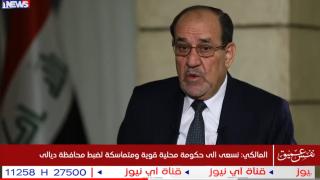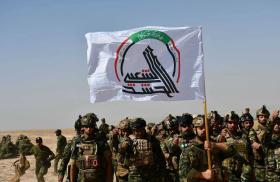Diyala Governorship Shows Badr Leaning on Maliki to Remain Competitive
As Militia Spotlight previewed, the tussle in Diyala shows that Badr's slow political descent is encouraging various militias and tribal elements to scramble for power.
Almost a year ago, Militia Spotlight assessed that elections and local government formation in Iraq's Diyala province would provide important pointers about the Badr Organization's remaining strength and the rising power of its chief rival, Asaib Ahl al-Haq (AAH). This prediction is being borne out by recent developments.
The Political Result in Diyala
On August 1, ten of the fifteen members of the Diyala Provincial Council elected Adnan al-Jaber as the province's new governor. Jaber represents former prime minister Nouri al-Maliki’s State of Law Alliance, though the latter has no representation on the Diyala council. How did this happen? According to remarks Maliki made during a March 26 appearance on iNews, State of Law was able to determine the governor of Diyala based on its past deal with Hadi al-Ameri's Talahof Nabni (We Build Coalition), under which Maliki's faction would select three governorships. Badr decided that one of these should be Diyala (Figure 1).
Other top positions filled this month included the reappointment of incumbent Provincial Council chair Omar al-Kerwi—a Sunni from the Siyada list who has a long history of working with AAH in northern Diyala—and new deputy chair Salim al-Tamimi, a former Badrist who defected to AAH. In other words, none of the top three officials in the province's formal power structure hail from Badr, even though Diyala has historically been viewed as a principality of Badr and Ameri.
Did AAH Beat Badr in Diyala?
Diyala was the only location in Iraq where Badr and AAH ran against each other in last December’s provincial elections, spurring Militia Spotlight to highlight that race as one to watch as far back as September 2023. The logic at the time was that if Badr (and Diyala tribal representative Faleh al-Fayyad) could not collectively beat AAH on Ameri and Fayyad’s home turf of Diyala, then the national tide may have turned decisively in AAH’s favor.
As Inside Iraqi Politics has chronicled, Ameri's Talahof Nabni list won the larger bloc in parliament (107,554 votes, translating to four seats) but seemingly needed help from Maliki’s State of Law, which did not field candidates of its own and sent an unknown number of tactical votes in Nabni’s direction. (To Nabni’s haul, one might add the 29,961 votes and one seat belonging to the nominally independent Asar bloc. Asar is led by acting speaker of parliamentary Muhsin al-Mandalawi, who is a Badr ally for now.)
In contrast, the AAH-led list Tahalof al-Safwa al-Watani (National Elites Coalition, running locally as "Diyala’s Right"), won 44,195 votes and two seats. The reappointment of Kerwi—a former Islamic State commander turned militiaman—as council chair keeps the body beholden to a figure who is close to both AAH (a U.S.-designated terrorist group) and the Siyada list (led by U.S.-designated politician Khamis al-Khanjar). (Siyada won 73,890 votes and three seats in the 2023 election.) AAH also used its local heft to select Salim al-Tamimi as deputy governor—one of several Tamimi tribal leaders to defect to AAH amid violent intra-Badr feuding in Diyala. On November 30, 2023, some of Tamimi's relatives were attacked in a local ambush that killed eleven men, women, and children.
Implications for the Badr-AAH Balance of Power
Hadi al-Ameri has suffered a bruising year in Diyala and other locales where he is battling AAH (e.g., Salah al-Din). He tried to dislodge his main proxy in Diyala (former governor Muthanna al-Tamimi) and replace him with Mohammed Jassim al-Omairi—son of Ameri’s pet judge Jassim Abboud al-Omairi, president of the militia-controlled Federal Supreme Court. Muthanna and other Diyala chiefs now see that Ameri cannot win even his home province without Maliki’s help—and the price of that victory was to leave Badr-supported Tamimis outside the local government while AAH-aligned Tamimis received key posts.
At the national level, Inside Iraqi Politics calculates that Badr won two council chairs and two governorships, compared to AAH's total of two chairs and one governor (the U.S.-designated terrorist Adnan Fayhan in Babil province). If AAH’s partners are factored in, the formal balance of power has shifted in favor of the group and its leader, Qais al-Khazali. In terms of “shadow power”—that is, state capture that enables groups to dominate officials and direct financial flows toward terrorism threat financing—AAH is probably outstripping Badr already and growing fast. For opponents of Iran-backed terrorist militias in Iraq, AAH is increasingly the one to watch, and the one to counter most urgently in fields such as terrorism threat financing.





